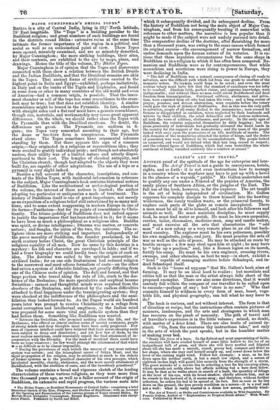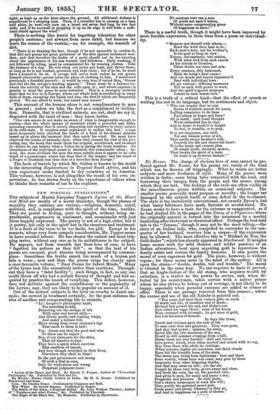GA.LTON'S ART OF TRAVEL. * ANOTHER proof of the aptitude of
the age for enterprise and loco- motion. The Art of Travel is not a guide to conveyances, hotels, sights, and so forth : it is not even instructions how to manage in a country where the wayfarer may have to put up with a hovel in the absence of a wayside " public." Mr. Galton undertakes not to qualify any one under a Nimrod of the prairies of America, the sandy plains of Southern Africa, or the jungles of the East. The full use of the book, however, is for the explorer. The art taught is the art of being independent of civilization. Mr. Chilton supposes his complete disciple to throw himself into the howling wilderness, the rarely trodden waste, or the primaeval forests, to explore such parts of the globe as remain unexplored. There a man must be all in all to himself, and look after his followers and animals as well. He must maintain discipline, he must supply food, he must find water or perish. He must be his own carpenter, currier, tailor, shoemaker, medicine-man, soap and candle maker, and must exercise all the arts that characterize the "odd man" of a new colony or a very remote place in an old but back- ward country. The explorer must be his own policeman, possibly his own magistrate, judge, and jury. He must practise the arts of war as well as the arts of peace. He may be attacked en route by hostile savages : a few may steal upon him at night ; he may have to "take up a position," and, like a Boman legion on its march, fortify his camp. He must be his own engineer, crossing rivers, swamps, and other obstacles, as best he may—in short, exhibit a " head " capable of managing matters before Sebastopol, and in- deed Sebastopol itself.
Such is the " hoino ad unguem " that Mr. Galton's book aims at forming. It may be an ideal hard to realize ; but moralists and critics tell us that the man or the artist always falls short of the proposed exemplar. There are also some directions, that it would scarcely fall within the compass of one traveller to be called upon to execute—perhaps of any ; but "store is no sore." Who that commits himself to wildness in every form of man, beast, vege- table life, and physical geography, can tell what he may have to do ?
The book is curious, and not without interest. The form is that of direction or recipe, but the instructions often contain pictures of manners, landscapes, and the arts and stratagems to which man has recourse on the pinch of necessity. The pith of travel and of traveller's experience is in the little volume; mixed, no doubt, with matter of a drier kind. There are also traits of animal in- stinct. "Go, from the creatures thy instructions take," not only in the arts of which the poet speaks, but in the humbler matter of making your bed.
"Study the form of a hare. In the flattest and most unpromising of fields, the creature will have availed herself of some little hollow to the lee of an insignificant tuft of grass, and there she will have nestled and fidgeted about till she has made a smooth, round, grassy bed, compact and fitted to her shape, where she may curl herself snugly up, and cower down below the level of the cutting night wind. Follow her example : a man, as he lies down upon his mother earth, is but a small low object, and a screen of eighteen inches high will guard him securely from the strength of a storm. The great mistake of a novice lies in selecting a tree for his camping-place, which spreads out nobly above but affords nothing but a bare stem below. It may be that as he walks about in search of a bush, the quantity of foliage at the level of his eye, with its broad shadow, chiefly attracts him, and as he stands to the leeward of it, it seems snug ; and therefore, without further reflection, he orders his bed to be spread at its foot. But as soon as he lies down on the ground, the tree proves worthless as a screen—it is a roof and not a wall: what is really wanted is a dense low screen, perfectly wind-
• The Art of Travel ; or Shifts and Contrivances available in Wild Countries. By Francis Galion, Author of "Explorations in Tropical South Africa." With Wood- cuts. Published by Murray.
tight, as high up as the knee above the ground. All additional defence i. superfluous to a sleeping man. Thus, if a traveller has to encamp on a bare turf plain, he need only turn up a broad sod seven feet long by two feet wide, and if he succeeds in propping it up on its edge it will form a suffi- cient shield against the wind."
There is nothing like travel for begetting toleration for other people's customs; not always: from mere habit, but because we learn the reason of the custom,—as, for example, the warmth of dirt.
"There is no denying the fact, though it be not agreeable to confess it, that dirt and grease are great protectors of the skin against inclement wea- ther, and that therefore the leader of a party should not be too exacting about the appearance of his less warmly clad followers. Daily washing, if not followed by oiling, must be compensated for by wearing clothes. Take the instance of a dog. He will sleep out under any bush, and thrive there, so long as he is not washed, groomed, and kept clean ; but if he be, he must have a kennel to lie in. A savage will never wash unless he can grease himself afterwards—grease takes the place of clothing to him. I mentioned previously a Swedish proverb ; it would be very true if varied thus, 'Grease and dirt are the savage's wearing apparel There must be a balance be- tween the activity of the skin and the calls upon it ; and where exposure is greater so must the pores be more defended. This is a strangely artificial state that we live in in Europe, where our whole body is swathed up in many folds of dress, excepting the hands and face, the first of which are frequently gloved. We can afford to wash, but naked men cannot."
This account of the human odour is not complimentary to man in general ; unless we take the fact as a compliment to eiviliza- tion. Domestic, that is civilized animals, are not, shall we say it, disgusted with the taint of man : they know better.
"Our own senses do not make us aware of what is disagreeable enough to confess—that the whole species of mankind yields a powerful and wide- spreading emanation that is utterly disgusting and repulsive to every animal in its wild state. It requires some experience to realize this fact : a man must frequently have watched the heads of a herd of far-distant animals tossed up in alarm the :moment that they catch his wind. He must have observed the tracks of animals—how, when they crossed his own of the pre- ceding day, the beast that made them has stopped, scrutinized, and shunned it—before he can believe what a Yahoo he is among the brute creation. No cleanliness of the individual seems to diminish this remarkable odour ; in- deed, the more civilized the man the more subtile does it appear to be—the touch of a gamekeeper scarce less than that of the master, and the touch of a Negro or Bushman less than that of a traveller from Europe."
The book of travels by which Mr. Galton is known to the world is the interesting Explorations in Tropical South Africa, and his own experience seems limited to dry countries or to America. This volume, however, is not altogether the result of his own ob- servation; he has drawn freely on the experience of others when he thinks their remarks of use to the explorer.



























 Previous page
Previous page